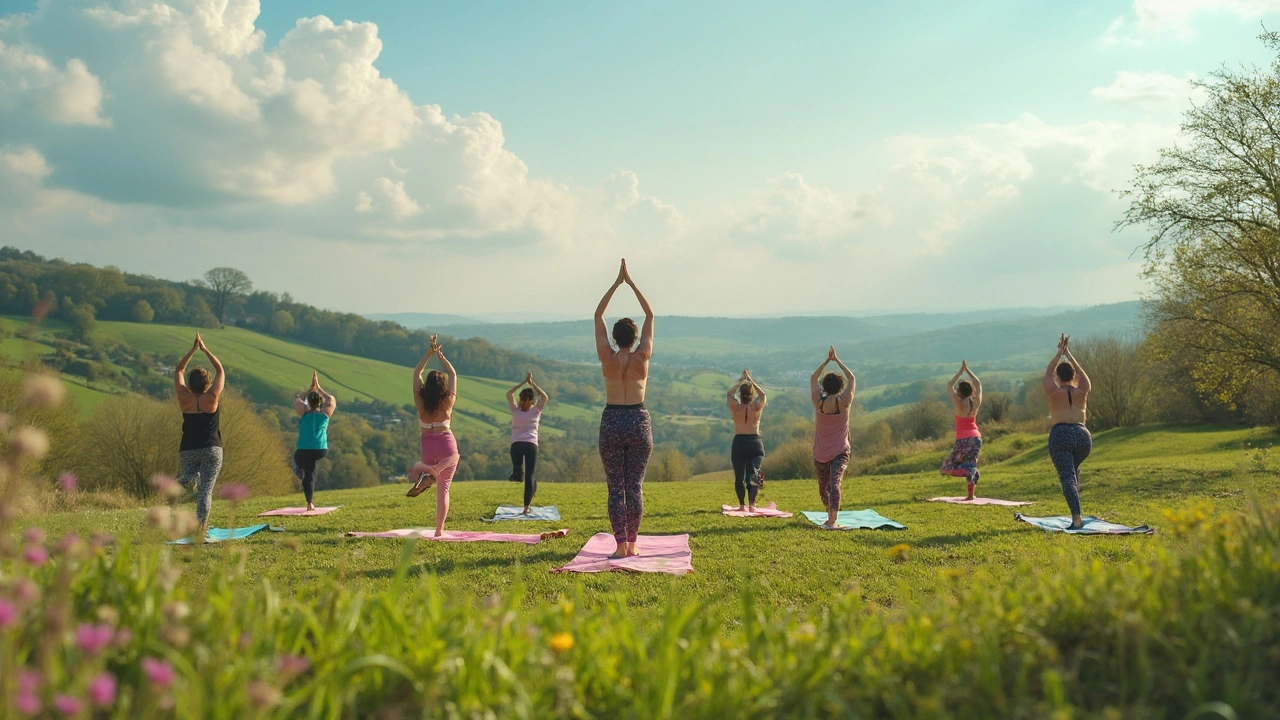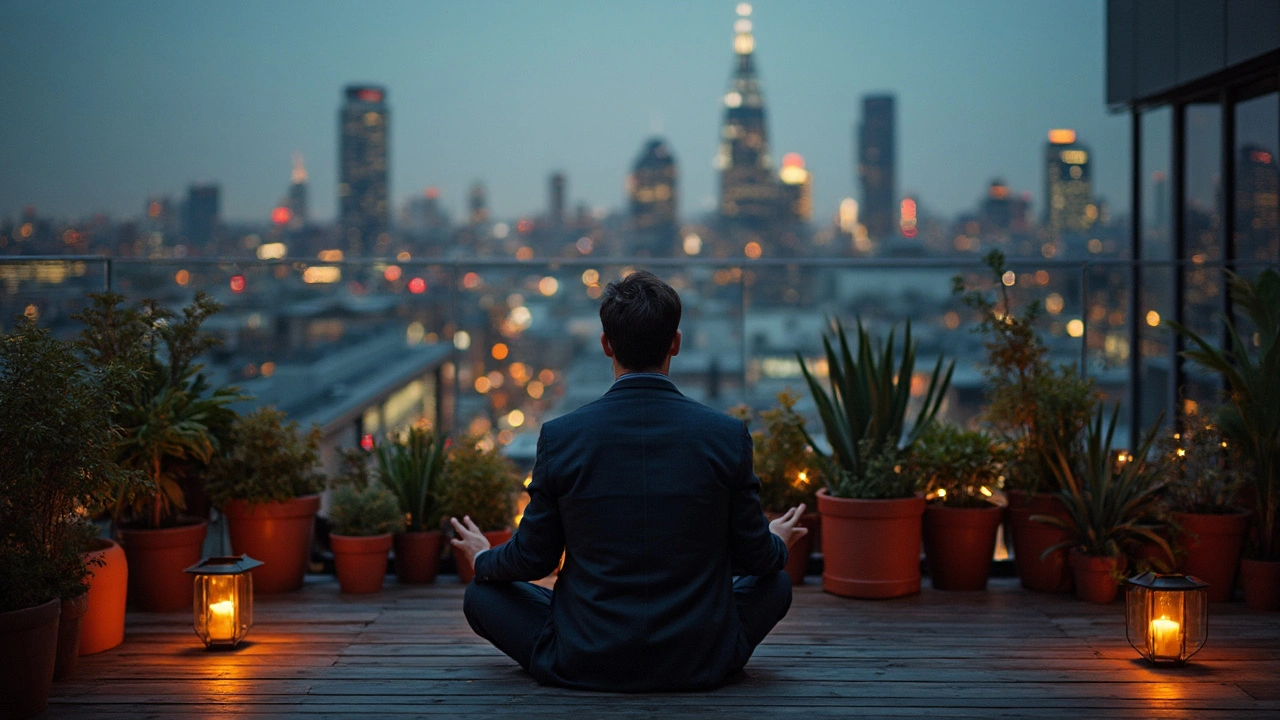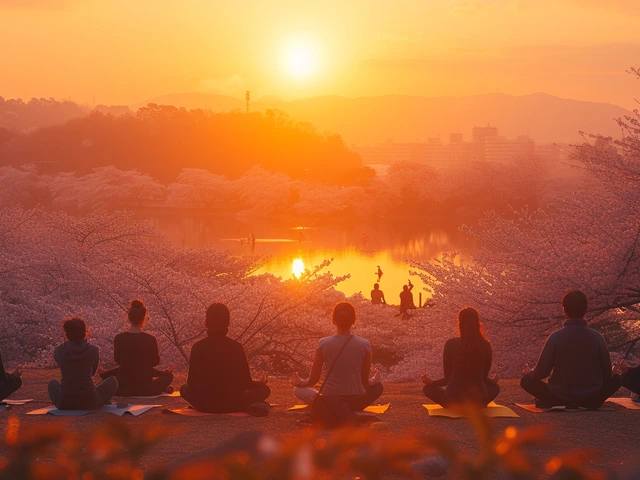Feeling overwhelmed? You're not alone. We all face stress in one way or another, whether it's from work, family life, or just the hustle and bustle of daily existence. But here's the thing: learning how to relax can change the game for you.
Picture this: just five minutes of focused breathing can make a world of difference. It's not just about closing your eyes and taking a few deep breaths—although that's a good start. It's about really tuning in to your body, feeling every inhale and exhale. This simple practice can lower your heart rate and release tension.
Now, imagine incorporating a bit of meditation into your routine. You don't have to commit to an hour-long session in a quiet room. Start small. Even a few minutes of mindfulness can help ground you, making it easier to tackle whatever comes your way.
- Why Relaxation Matters
- Simple Breathing Exercises
- The Magic of Meditation
- Benefits of Yoga and Stretching
- Incorporating Relaxation into Daily Life
- Technology Aids for Relaxation
Why Relaxation Matters
You might think of relaxation as just a way to unwind after a long day, but it’s so much more. It’s a vital part of maintaining good mental health and boosting our overall well-being. Think about it—when we’re stressed, our bodies respond by releasing stress hormones like cortisol. While a little stress isn't bad, too much can lead to problems like high blood pressure and heart issues.
Let’s break it down a bit. When you take time to relax, you actively counter those stress responses. That's because relaxation techniques trigger a “relaxation response.” It's a term coined by Dr. Herbert Benson, a Harvard Cardiologist, in the 1970s. This state is the opposite of the stress response. Your heart rate slows, muscle tension decreases, and you experience a sense of calm.
More Than Just a Quick Fix
On top of improving your current mood, regular stress relief activities can improve long-term health. Studies show that those who engage regularly in relaxation techniques are less likely to suffer from anxiety and depression. They also report better sleep quality, which we all know is crucial for functioning well.
Plus, relaxation doesn't just benefit your mind—it has physical perks too. Ever notice how your muscles feel looser after a good stretch or walk? That’s your body thanking you for a break from stress. Over time, this can improve flexibility and reduce pain.
The Social and Productivity Boost
Taking time to relax can also make you more productive. Weird, right? But by stepping back, you allow your brain to recharge. This clearer mind can help you tackle tasks more efficiently—goodbye, stressful workdays.
And let’s not forget the impact on your social life. When you're less stressed and more relaxed, you're more likely to engage with others. You can even improve your relationships, since a calmer you is a more approachable and open you. Who wouldn't want that?
| Benefits of Relaxation | Impact |
|---|---|
| Lower Blood Pressure | Reduces risks of cardiovascular diseases |
| Improved Sleep | Enhances mental alertness |
| Decreased Anxiety | Boosts emotional stability |
| Increased Flexibility | Lessens physical pain |
The Magic of Meditation
So, what's the deal with meditation, and why is everyone talking about it? Well, meditation is like a mental reset button. It's a practice that helps calm your mind and offers a bunch of benefits that can seriously improve your quality of life. It's not about emptying your mind but rather focusing it.
Understanding the Basics
Meditation can be as straightforward or complex as you make it. At its core, it usually involves sitting quietly, removing distractions, and focusing on your breath or a specific thought. There are several types of meditation, but most share the common goal of achieving peace of mind.
Benefits Backed by Science
Did you know that studies have shown meditation can reduce stress and anxiety by up to 60%? Regular practice can also lower blood pressure and improve sleep quality. It's all about reducing that pesky mental clutter.
Mental health professionals often recommend meditation for its ability to enhance emotional health. The practice has been known to promote self-awareness, helping you understand your emotions better and react more calmly to stressful situations.
Simple Steps to Start
- Find a quiet spot where you won't be disturbed.
- Set a timer for 5 to 10 minutes to start, so you're not constantly checking the clock.
- Get comfortable—sit or lie down, whatever feels right.
- Close your eyes and focus on your breathing. Notice each inhale and exhale.
- If your mind starts to wander (which it will), gently bring your focus back to your breath.
And that's it! With daily practice, those few minutes can become the most peaceful part of your day.
Cool Tools to Help You
If you're someone who doesn't like going it alone, there are plenty of meditation apps out there. Headspace and Calm are two popular ones that offer guided sessions to ease you in.
| App | Features | Cost |
|---|---|---|
| Headspace | Guided sessions, themed meditations, sleep sounds | Free & Paid Versions |
| Calm | Guided sessions, daily calming activities, sleep stories | Free & Paid Versions |
Give meditation a shot and watch as your stress melts away. With a bit of commitment, it might just become your favorite relaxation technique.

Benefits of Yoga and Stretching
Have you ever thought about why yoga and stretching have been around for ages? Well, there's a reason they're still buzzing in every gym and wellness retreat. These practices aren't just about touching your toes or twisting into a pretzel—they're a fantastic way to enhance your mental health and physical well-being.
Boost Flexibility and Strength
It's a no-brainer that stretching helps improve flexibility. By regularly practicing yoga, you’re not only elongating muscles but also strengthening them. This means over time, your body will become more adaptable and less prone to injuries. And who doesn't want to avoid those little aches and pains?
Stress Release
Here's where the magic happens: both practices are powerful tools for stress relief. Engaging in yoga is like hitting the refresh button—regulating breathing and focusing on movements helps calm the mind and reduce stress. These exercises also promote the release of endorphins, those feel-good hormones, making you happier and more relaxed.
Improved Posture and Balance
If you're hunched over a desk all day, yoga could be your best friend. Regular sessions can align your posture while improving balance. Certain poses focus on strengthening the core, which supports a straight spine and helps you stand taller. Plus, better posture often leads to boosted confidence.
Overall Well-being
It's not just about the physical—it’s also about mental peace. Studies have found that yoga practitioners often experience improved sleep and reduced symptoms of anxiety. This is mainly because yoga encourages mindfulness and helps combat the racing thoughts that often keep us up at night.
| Benefits | Explanation |
|---|---|
| Flexibility | Makes muscles adaptable and stretchy |
| Strength | Increases muscle tone and power |
| Stress Relief | Reduces cortisol levels |
| Posture | Enhances body alignment |
So, next time you're feeling overwhelmed, why not unroll that yoga mat and stretch it out? Whether it's through a YouTube video or a class at your local studio, bringing yoga and stretching into your life can be a game-changer for your overall well-being.
Incorporating Relaxation into Daily Life
We get it—life can be hectic, and adding anything new to your routine might sound like a chore. But here's the kicker: relaxation doesn't have to be complicated. You can slip it into your day without even rearranging your schedule too much. Ready to try it out?
1. Start Your Morning Right
Begin with a simple ritual like stretching when you wake up. It doesn't have to be a full yoga session. A few stretches get your blood flowing and start your day in a calm mindset. Dr. Emily Fried, a wellness expert, says,
"A few minutes of stretching in the morning sets the tone for your whole day, boosting your mood and energy."
2. Use Breaks Wisely
We all take breaks—grab a coffee, check our phones, or chat with friends. Next time, spend a few break moments practicing deep breathing or even a quick meditation session instead. Just 3 to 5 minutes can help refocus your mind and chill out those racing thoughts.
3. Make Relaxation Non-negotiable
- Schedule it: Add relaxation to your to-do list and treat it like any other appointment. This makes it a priority.
- Tech timeouts: Try 'tech-free' times, especially before bed. This can help unwind after a busy day.
- Practice gratitude: Before sleeping, jot down three things you're grateful for. This shifts focus from stress to positivity.
Research shows that around 75% of adults feel stressed, and simple lifestyle changes can significantly reduce that number. Check out the table below to see how short breaks make a difference.
| Break Activity | Mental Benefits |
|---|---|
| Deep Breathing | Improves focus, reduces anxiety |
| Mindful Meditation | Increases emotional resilience |
Finding time for relaxation can be your secret weapon against stress. It's about consistency, not perfection. Play around with these ideas and see what best fits your lifestyle.

Technology Aids for Relaxation
In our tech-savvy world, smartphones and gadgets aren't just for work or entertainment anymore. They're reshaping how we unwind too. Imagine having tools at your fingertips that guide you towards better relaxation and stress-busting moments. Sounds neat, right?
The Rise of Relaxation Apps
First off, let's talk about apps. There's a bunch of them designed specifically for stress relief. Headspace and Calm are two of the biggies. They offer guided meditations, sleep stories, and even breathing exercises. If you're new to meditation or can't spare much time, these are a great start. Plus, some offer bite-sized sessions lasting just three minutes. Easy to fit in, even on a busy day.
Wearable Tech to Track Relaxation
Then there are wearables like the Apple Watch or Fitbit. These handy gadgets don't just count steps anymore. They've evolved to monitor your stress levels using heart rate data. With this insight, you can be proactive about tackling stress, using your lunchtime to practice deep breathing or a quick meditation. Plus, they can give you reminders to move or breathe deeply if they sense you're stressed.
Relaxing Sounds and Smart Speakers
Have you tried Alexa or Google Home for relaxation? Simply asking them to play calming ocean waves or a guided meditation can turn your living room into a zen sanctuary. If you love falling asleep to soothing sounds, smart speakers make it effortless.
The VR Experience
And for the tech enthusiasts, virtual reality is the next frontier. Apps like Nature Treks VR transport you to serene landscapes where you can wander beaches or forests right from your living room. It's a perfect escape, especially if you can't find time for a real getaway.
So, if you're on the lookout for ways to stress less, these tech options might be worth exploring. They fit seamlessly into our busy lives while promoting a healthier, happier lifestyle. And let's be honest, who couldn't use a bit more mental health support?







